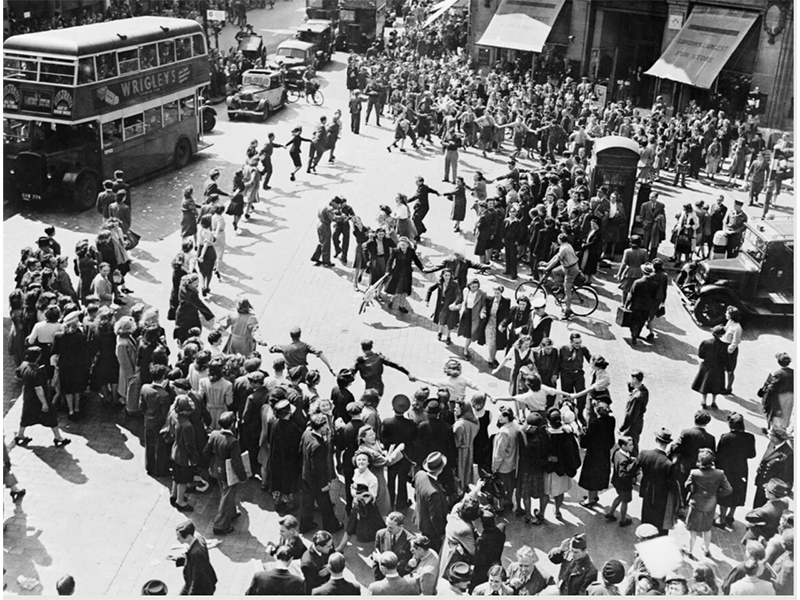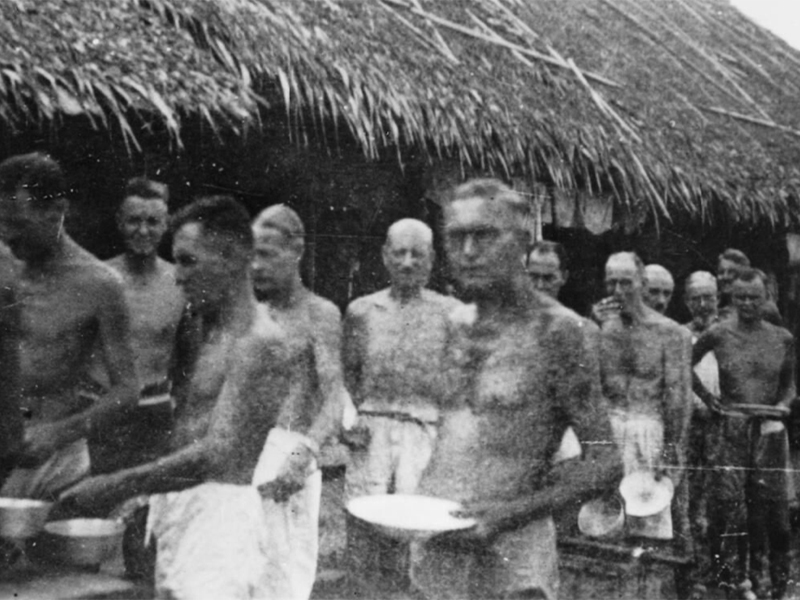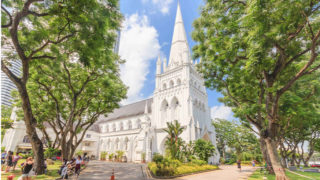August 2025 marks the 80th anniversary of VJ Day in Singapore, which effectively brought an end to World War II and six years of global conflict. EL contributor LIZ COWARD reflects on the events of the time and what they meant for this country.
On 15 August 1945, Emperor Hirohito announced that the Imperial government would accept the terms of the Potsdam Declaration in which the Allied powers had demanded Japan’s unconditional surrender. He didn’t use the word “surrender” in his address, which caused confusion among the listeners. It fell to a radio announcer to clarify that Japan had indeed been defeated.

In some quarters, the Emperor’s decision was received with outrage and insubordination. General Yamada of the Kwantang Army in Northern China went as far as to countermand the order to ceasefire and continued fighting until 24 August.
Unaware of these developments, in Europe the news was greeted with singing and dancing. Those who were closer to the action, like Singapore’s Prisoners of War (POWs) and civilian internees, were much more circumspect.
In August 1945, there were 12,000 POWs in Changi camp, a further 4,000 elsewhere on the island, along with 4,500 civilian internees in the Sime Road internment camp.

Confusion reigns before VJ Day in Singapore
In Changi, the POWs had hidden radios, so they were aware of the surrender. There were also rumours circulating in the civilian camp but there were no official announcements. As time wore on, the situation became farcical and confusing.
On 18 August, for instance, George Peet, a civilian internee wrote this:
“Last Thursday, a POW officer was said to have shouted over the fence that the war was over and that the relieving troops would arrive on the 25th… But alas! While we were eating our midday meal today, the deep drone of one of our planes was heard, and ‘ack-ack’ all over the island.”
Captain Jack Ennis, a Changi POW, expanded on this incident, writing:
“At 1245hrs one of our bombers came over low; he was heavily fired on from all over, north and northeast of us. Fighter planes went up after him. Koreans were lined up by ‘Y’ at 2030hrs and told that the War was over, but Japan had not surrendered unconditionally.”
The confusion was caused by General Seishiro Itagaki, commander-in-chief of the Seventh Area Army, who had 60,000 troops under his control in Singapore. He was a hard-liner and, like his superior officer, Field Marshall Count Terauchi, was reluctant to accept the Emperor’s decision.
Indeed, it was not until 19 August, when a British staff signals officer parachuted into Singapore for a face-to-face meeting, that Itagaki confirmed he would surrender.

An end finally in sight
The POWs were informed the same day, but it was not until 24 August that civilian internees were officially told. At the same time, they were warned: “Every care should be exercised to avoid any incident which might lead to misunderstanding and trouble between internees and Nipponese troops.”
Their own camp leaders advised them to stay put and carry on as normal until the relieving troops arrived.
Freddy Bloom had been an internee since 1942; her husband, Major Philip Bloom, was in the POW camp. She recorded her reaction to the advice.
“This was a sensible idea, but it didn’t suit me. So one day in the last week of August, Katherine and I put on our very best dresses which we’d saved for just such an occasion and crawled under the barbed wire and out of the camp. With studied sangfroid, we hailed a taxi and told him to drive us to Changi POW camp…
“The man on duty controlled himself long enough to tell us that the hospital was at the end of the avenue to the left… Philip was not there. Then somebody remembered that he had gone to see an old friend and rushed off to fetch him. I was taken to the room he shared with a dozen other doctors. His bed was pointed out to me… He had a sheet on it. The sheet was clean… but it had been mended with different coloured threads in the most incompetent cobbling stitches… I looked at that sheet and began to cry. Then he came in and put his arms around me. I buried my head in his chest and sobbed.”
The VJ day celebrations that had swept through Europe on 15 August were long gone by the time the POWs and internees returned home.
Last word
On 15 August 2025, many countries will commemorate the 80th anniversary of Victory over Japan (VJ) Day which brought World War Two to a close. It was a conflict which, in Asia-Pacific alone, cost over 25 million lives. It also wrought widespread devastation and heralded the start of civil wars. This year’s commemorations will be orderly and predictable – a far cry from the first VJ Day in Singapore in 1945.
To make the most of living in Singapore, read our latest City Guide here for free!
This article on VJ Day in Singapore first appeared in the August 2025 edition of Expat Living. You can purchase the latest issue or subscribe so you never miss a copy!
Don't miss out on the latest events, news and
competitions by signing up to our newsletter!
By signing up, you'll receive our weekly newsletter and offers which you can update or unsubscribe to anytime.



